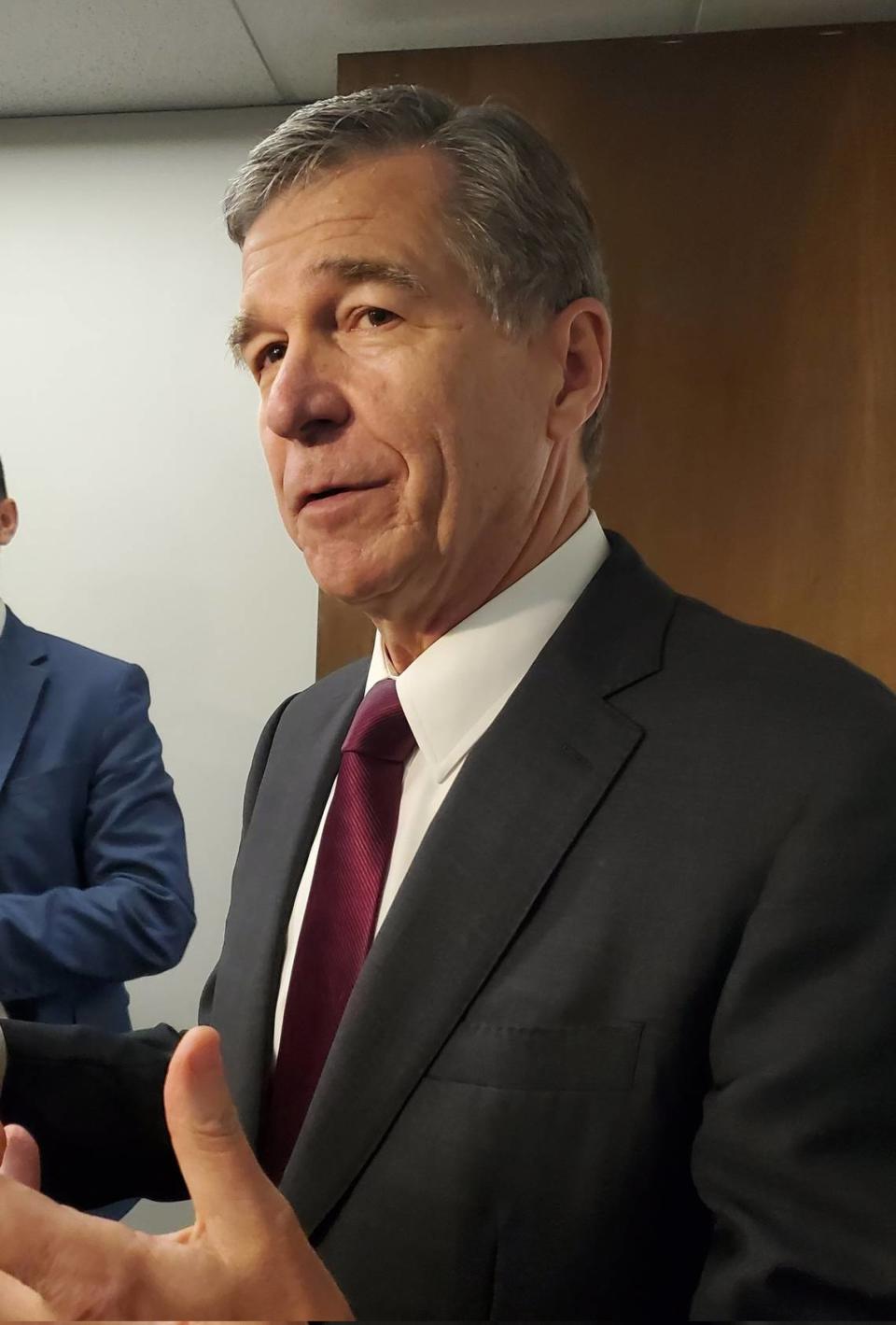Done by July 1? Berger hopes NC House, Senate reach budget deal in days, exit soon after
- Oops!Something went wrong.Please try again later.
North Carolina state lawmakers are still saying they want to finish up their session by July 1, and that means getting a budget bill done by then, too.
Senate leader Phil Berger said Tuesday that he hopes the House and Senate can reach their budget agreement within 10 days. At stake are more raises for state employees and teachers, building and infrastructure projects, and what many people notice most now: high prices everywhere and how much of their money the government keeps.
The session began May 18. Leaders of the General Assembly, which is majority Republican, have already reached a deal on the total spending amount: $29.5 to $30 billion. House budget leaders are amenable to Democratic Gov. Roy Cooper’s budget proposal to give state employees and teachers bigger raises than they’re already slated to receive this year. There is a 20% vacancy rate across state government jobs.
But talks with the governor are still informal at this point, while the two chambers work out how they’ll spend that roughly $30 billion this coming fiscal year, from the amount of raises to what kind of tax cuts might be included.
“I think we’ve got to get the legislature’s position locked down before it makes a whole lot of sense for us to get into any real detail with the governor,” Berger told reporters on Tuesday.
“There have been some informal conversations back and forth with the governor and amongst staff of the governor, staff of the General Assembly. But I think as far as anything that I would consider to be a negotiation on a particular point it really has to wait until we know what the legislative position is, and we’re still trying to work that out with the House at this point.”
What kind of tax breaks?
Berger’s priority for the session is reducing taxes.
“I’d like to see us somehow deal with some sort of tax relief for the citizens,” he said.
“We’ve got all this money that has come in. I think it’s important for us to show that we have a system that generates more money than we need to deal with the day-to-day operation of government that we reduce the burden on the taxpaying public,” Berger said.
The state expects more than $6 billion in projected tax revenue surplus.
Both House and Senate Republican leaders have said they support further reductions in the personal income tax rate, but have not ruled out a one-time tax rebate. That’s what Democrats want, and have proposed a $200 gas tax rebate to licensed drivers age 18 and older.
Cooper, who did not include tax cuts in his budget proposal, is open to the idea.
“I would support relief for everyday people,” Cooper told reporters on Tuesday, “and the gas pump is one place to do that versus more overall corporate tax cuts and more overall income tax cuts, particularly that benefit the very wealthiest among us. I would rather them go that route, but obviously these are all part of budget negotiations right now.”
Chance of Medicaid expansion in budget deal
Both Berger and Cooper would be glad for the budget bill to include Medicaid expansion, which Senate Republicans came around to supporting but which House Republicans have been emphatically not interested in passing this year. The Senate passed House Bill 149, “Expanding Access to Healthcare,” last week.
“I’d be fine with that being part of the budget. Whether or not we can get the House to agree to that, no, not something that’s happened yet,” Berger said.
Cooper, who has long pushed for Medicaid expansion, agrees. And he also knows the House is the current gatekeeper of the bill.
“I do support it. I’m encouraged that the Senate has passed this legislation,” Cooper told reporters on Tuesday after a Council of State meeting. “I know that it will be part of the discussions that we have over the next few weeks, and I hope that people in communities will talk to their legislators, particularly members of the House, about how important this is.”

House Speaker Tim Moore and other Republicans have repeatedly said they don’t want to vote on Medicaid expansion this year.
Moore noted that the next session is seven months away. The election is in November for all 170 General Assembly seats, so it will include a new crop of lawmakers. Berger, Moore and several other Republican leaders are all running opposed.
State budget timeline
“We’re just starting talks right now,” Cooper said about the budget. “I think it’s important for us to put everything on the table and talk about these issues. I will say, though, that the Medicaid expansion issue is really a yes or no issue. Are we going to take it or are we not?”
Cooper said money coming to the state if it expands Medicaid would “help us with behavioral health and mental health, and right now that’s being brought to the forefront as we deal with this gun violence across the country,” he said.
Berger’s timeline of a week to 10 days for the next step in the budget process includes the caveat that he is “hopeful” the legislature will have their position locked down by then. Beyond taxes, there are still some other decisions that need to be made in a “wide range of areas,” he said.
That sets the clock for House and Senate agreement on a potential budget deal by June 17. The fiscal year starts July 1, but there is already a spending plan in place for the coming year, regardless if a new budget bill becomes law.
For more North Carolina government and politics news, listen to the Under the Dome politics podcast from The News & Observer and the NC Insider. You can find it at https://campsite.bio/underthedome or wherever you get your podcasts.

